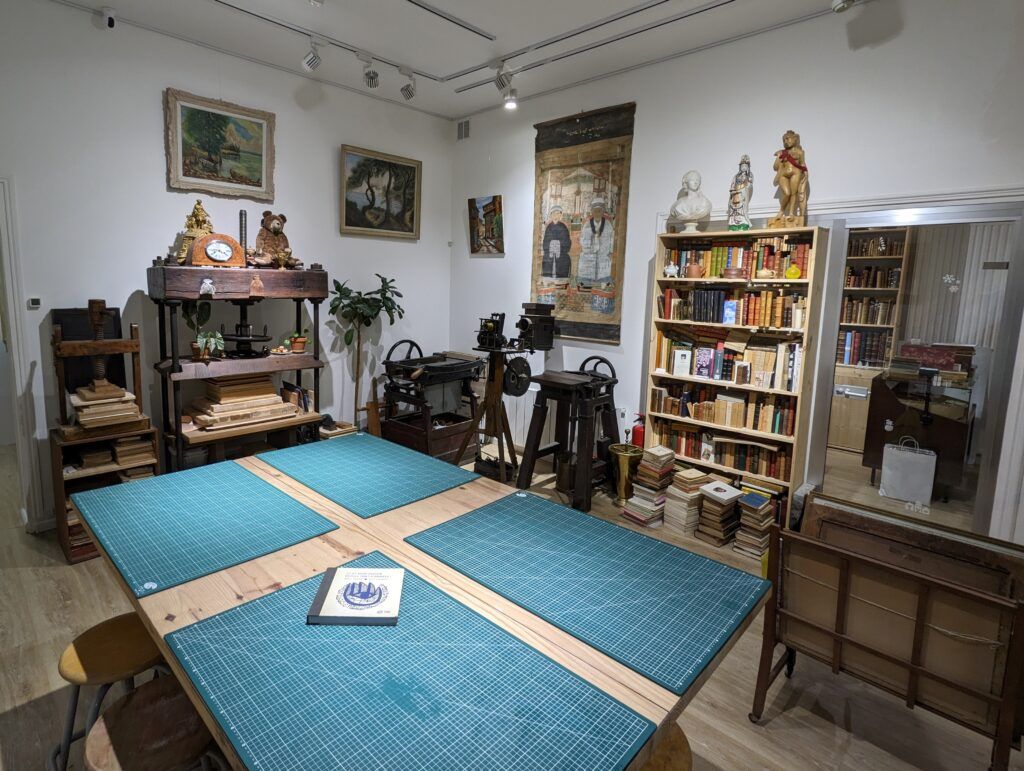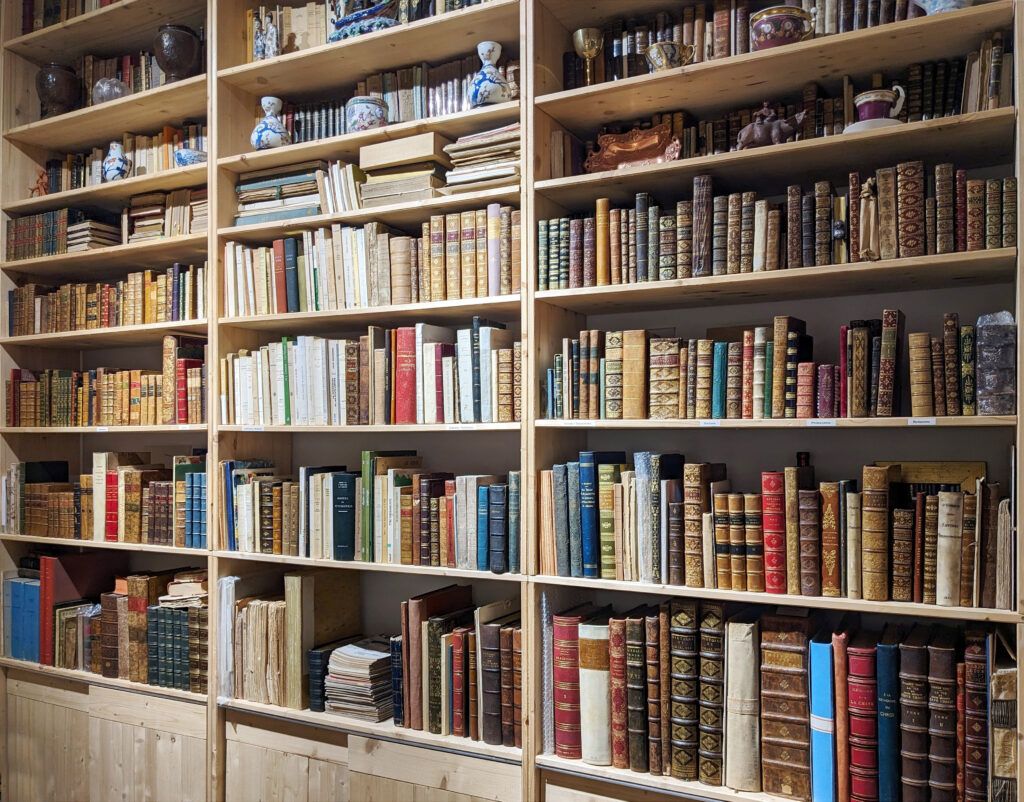Terri is co-founder, webmaster, and editor of The Hyacinth Review.…
I had the good fortune during my time living in Paris to take a traditional bookbinding course at Librairie-Galerie Emmanuel Fradois from Emmanuel himself. There is something magical about the little shop, tucked away in Paris’ 20th arrondissement, and the first time I walked in and saw the glittering shelves of leather-bound books I couldn’t help but feel emotional.
Located near the Père Lachaise cemetery, the Librairie is both a store specializing in rare books and a workshop space that offers courses in bookbinding, book restoration, and gilding. They also host exhibitions showcasing book and book-related collections as well as works by contemporary artists.
Emmanuel is an extremely knowledgeable, kind, and patient teacher – if you’re in Paris I highly recommend taking one of the many courses on offer, or making the time to stop by and shop. You can also visit his shop online here.
So, without further ado, I’m excited to present to you our interview with Emmanuel Fradois in the hopes that it will inspire you to explore the beautiful art of bookbinding and fuel your bibliophile pursuits.
- Visit the online shop: Librarie-Galerie Emmanuel Fradois
- Get in touch: contact@livresetmanuscrits.com
What inspired you to open your bookshop and gallery, and what was your journey like?
My parents sold antiques and second-hand goods, including books, for a living. As an undergraduate Law student in Toulouse, I too began purchasing books at flea markets and garage sales, and promptly starting selling them online in order to be able to afford more. When it came time to choose between chasing a government job and becoming a professional book-dealer, I didn’t hesitate…
In order to reach out to collectors, rare book dealers regularly publish catalogs of their new acquisitions with detailed descriptions (and sometimes photos) of the books. In 2012, I completed my first catalog, listing 40 items, and sent it to fellow book dealers. That summer, I also attended my first bookfair on Paris’ Place Saint-Sulpice.
During my first seven years as a book dealer, I worked without a physical store, selling mostly through catalogs and my website. I eventually ran out of space, though, and found myself needing a workshop in order to restore the books. I soon realized that I could share the workshop and tools by offering courses in book-related crafts: although there are few hundred antiquarian and second-hand booksellers in France, including some 200 in Paris alone, we are one of the only ones with a workshop. The Librairie opened in September 2019 in the 20th arrondissement of Paris—that is, some distance from the neighborhoods where most of the city’s antiquarian bookdealers are concentrated.

For our readers who may not be aware, there is a difference between a bibliophile and someone who has a love of reading books. How would you define this distinction?
A bibliophile is someone who loves and collects books, often focusing on rare editions, unique bindings, or historical significance. They may not necessarily read all the books they collect.
In fact, I’d say that a good portion of our local customers are readers rather than bibliophiles: in addition to collectible books, we also offer a selection of used “reading books” that we don’t list on our website. In practice, of course, there’s a certain degree of porosity between the categories of “bibliophiles” and “book readers”, just as there can be books that are both “reading books” and “collectible books”.
Where did your personal love of books come from?
I’ve always loved treasure hunting at flea markets and garage-sales, and before I got into books I’ve collected other items: stamps, knives, coins… books, however, are in my opinion more complex, because they cover such a broad range of human knowledge — a lifetime isn’t enough to learn all there is to know about them.

As the owner of a rare bookshop, you see a lot of unique books and manuscripts. Is there a book or manuscript that you’ve come across that stands out in your memory as particularly unusual?
A few years ago, while traveling in southwestern France, I purchased a XIXth century liber amicorum—that is, a “friendship album” in which friends or acquaintances of the album’s owner wrote poems or notes, drew… That particular album bore the signatures of a dozen or so somewhat famous French Romantic poets, and it had been gifted to its owner, a young woman named Cora Pinard, by Juliusz Słowacki, one of Poland’s most important writers. Słowacki himself had handwritten some poetry in Pinard’s album: after doing some research, I realized that the poem from the album –in which the speaker, sitting on a bench in the Père Lachaise cemetery, meditates on the subject of the apocalypse- had never been published, and was known to scholars only through a fragment! Pinard’s album is now housed in Poland’s National Library.
You offer courses on bookbinding, book restoration, gilding, and calligraphy. Do you have a personal favorite among these crafts?
I’d describe myself as a “technician” rather than an artist, and I’m more interested in preserving things than in creating them—so my favorite would be book restoration.
Are there any mediums that you’ve tried in the past, but no longer work with? If so, what made you move on from them?
Courses in Arabic and Persian calligraphy used to be offered at the shop. However, when the teacher retired, I wasn’t able to find a replacement for him. It’s a shame, really, because those courses had proven to be really valuable, especially for second generation North-African and Middle-Eastern immigrants who can speak Arabic or Farsi but cannot write it, and who are eager to reconnect with their families’ cultural roots.
Bookbinding, typography, and other book-related techniques vary between countries. What sets France apart from others in the bibliophile world?
When it comes to bookbinding specifically, while most other European countries turned to more industrialized bookbinding in the 18th century, France –thanks in part to the support of aristocrats and the state—managed to maintain a tradition of luxury bookbinding throughout the 19th century. French collectors have also tended to display a preference for rich ornamentation that you won’t find in countries where Protestantism has been more influential, and where sobriety is encouraged. So I would say that overall “art bookbinding” has been more prevalent in France.
What advice would you give to someone who wants to begin collecting books?
For those starting to collect books, I recommend:
- Focus on a specific area or theme that interests you.
- Learn about book conditions and terminology.
- Build relationships with reputable dealers and fellow collectors.
- Attend book fairs and auctions to gain experience.
- Always prioritize quality over quantity in your collection.
As a literary magazine, we have to ask: which books would you consider to be your top 5 favorites (either to read or as objects) ?
I don’t actually have much of an interest in fiction, so some of my favorite books to browse are the exhibition catalogues published by France’s National Library (BnF). They’re quite richly illustrated, so they might prove interesting even to someone who doesn’t understand French, and they’re both entertaining and useful as documentary resources for my day to day work.
- Visit the online shop: Librarie-Galerie Emmanuel Fradois











